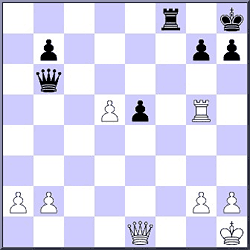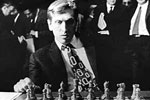A great moment in chess (Part 1)
By Prof. Christian Hesse

Ultimately chess is just chess - not the best thing in the world
and not the worst thing in the world, but there is nothing quite like it.
– W.C. Fields
It’s 7 minutes past 5 o’clock in the afternoon on July 17th, 1972.
The place is a small backstage room of Laugardalsholl in Reykjavik on the island
of Iceland, the venue for the Fischer versus Spassky World Championship Match.
It’s Game 3 of their titanic struggle which has been called the Match
of the Century by some. But, I think, it was more than that, more than the Match
of the Century: It was the Match of all Time.
At the described moment, Fischer, playing Black, had just made his first move.
He couldn’t hear the thunderous applause from the more than 1000 spectators
in the main auditorium of the building. The match had been saved. Why was that?
And why was Game 3 played in the small room away from the spectators. And why
were the events right before it began decisive for the outcome of the match.
Let’s briefly review what had happened.
On the qualifying circuit, Fischer had defeated grandmasters Mark Taimanov,
Bent Larsen and Tigran Petrosian in candidates matches. The first two had been
demolished by 6:0, and Petrosian, a former World Champion who had a reputation
for losing two games in a row only once in a millennium, was taken apart by Fischer
with four straight wins.The magnitude of Fischers accomplishment was taken note
of with awe not only by the world of chess but by the world in general. Also,
it was the first time that a player from the West had single-handedly managed
to break through the phalanx of Russian super-grandmasters who had held a firm
grip on the supreme chess title and its surroundings since World War II.Having
beaten Petrosian, Fischer was then merely a step away from the World Championship.

The legendary American champion Bobby Fischer in 1972
The Fischer-Spassky match began on Saturday, July 1st, with a lavish opening
festival at Reykjavik’s National Theater, the presidents of Iceland and
of FIDE being in attendance, as well as ambassadors and other dignitaries. One
seat, however, remained empty, the seat next to Spassky: Fischer’s seat.
At this time, Fischer was still staying in Douglaston, New York, at the house
of his long time friend IM Anthony Saidy, because some of his conditions for
the match had not been met. At about the same time the Russian delegation demanded
a Fischer forfeit for Game 1 in view of his absence. FIDE President and former
World Champion Max Euwe, in a breach of regulations, postponed the start of
the first game by two days and set Fischer a firm deadline to appear: July 4th,
noon, Reykjavik time.
Chess was making international headlines. The events surrounding the Fischer-Spassky
encounter dominated the world’s press and in America pushed top-notch
political issues such as the Vietnam war and the US presidential nominations
to page 2. It seemed hopeless, though, that Fischer would come and play. Then
early on July 3rd, early afternoon, the US Secretary of State Henry Kissinger
placed a phone call to Fischer. “This is one of the two worst chess players
in the world speaking to the best.(…) America wants you to go over there
and beat the Russians.” Gudmundur Thorarinson, president of the Icelandic
Chess Federation later wrote about this phone call. ”Fischer’s lawyers
told me they had been present.(…) There was no way of getting him to Iceland.(…)
He was determined(…), but when Kissinger talked to him and told him that
he had to fight the Russians, they said his face changed.(…) He was like
a young man going into battle like a soldier, and he said:”I will fight
the Russians.””

Fischer arriving in Reykjavik on July 4th 1972
Later the same day, Fischer was driven to John F. Kennedy airport. There he
was secretly transferred to a small bus of Loftleidir Icelandic Airlines and
smuggled on board of flight 202A, destination Reykjavik. The plane took off
from JFK at 10.04 at night, some three hours later than scheduled. Fischer had
stopped the world this long, keeping all other passengers waiting, some even
being taken off the plane at the last moment to make room for Fischer’s
entourage. In spite of the secrecy, the Foreign Ministry in Moscow was aware
of this and started to inform the Russian delegation in Reykjavik that the American
Challenger was on his way. Fischer arrived at Iceland’s Keflavik airport
in the early hours of July 4th, some 10 hours before the expiration of Euwes
deadline to face Spassky.
Solution to last month's column
Lowcki-Tartakower, Jurata, 1937

Black to play, position after White's 32. move
In analysing how to proceed, Tartakower discovered the only winning manoeuvre.
What is it? Solution: 33…Qc5+ 34. Kh1 Qc4 35. Kg1 Qd4+ 36. Kh1
Qe4 37. Qc1 Qd3 38. Kg1 Qd4+ 39. Kh1 Qd2 0-1. [Click
to replay]
 About
the author
About
the author
Christian Hesse holds a Ph.D. from Harvard University and was on the faculty
of the University of California at Berkeley until 1991. Since then he is Professor
of Mathematics at the University of Stuttgart (Germany). Subsequently he has
been a visiting researcher and invited lecturer at universities around the world,
ranging from the Australian National University, Canberra, to the University
of Concepcion, Chile. Recently he authored “Expeditionen
in die Schachwelt” (Expeditions into the world of chess, ISBN 3-935748-14-0),
a collection of about 100 essays that the Viennese newspaper Der Standard
called “one of the most intellectually scintillating and recommendable books
on chess ever written.”
Christian Hesse is married, has a six-year-old daughter and a two-year-old
son. He lives in Mannheim and likes Voltaire's reply to the complaint: ”Life
is hard” – “Compared to what?”.
Previous articles for ChessBase:






















 About
the author
About
the author




